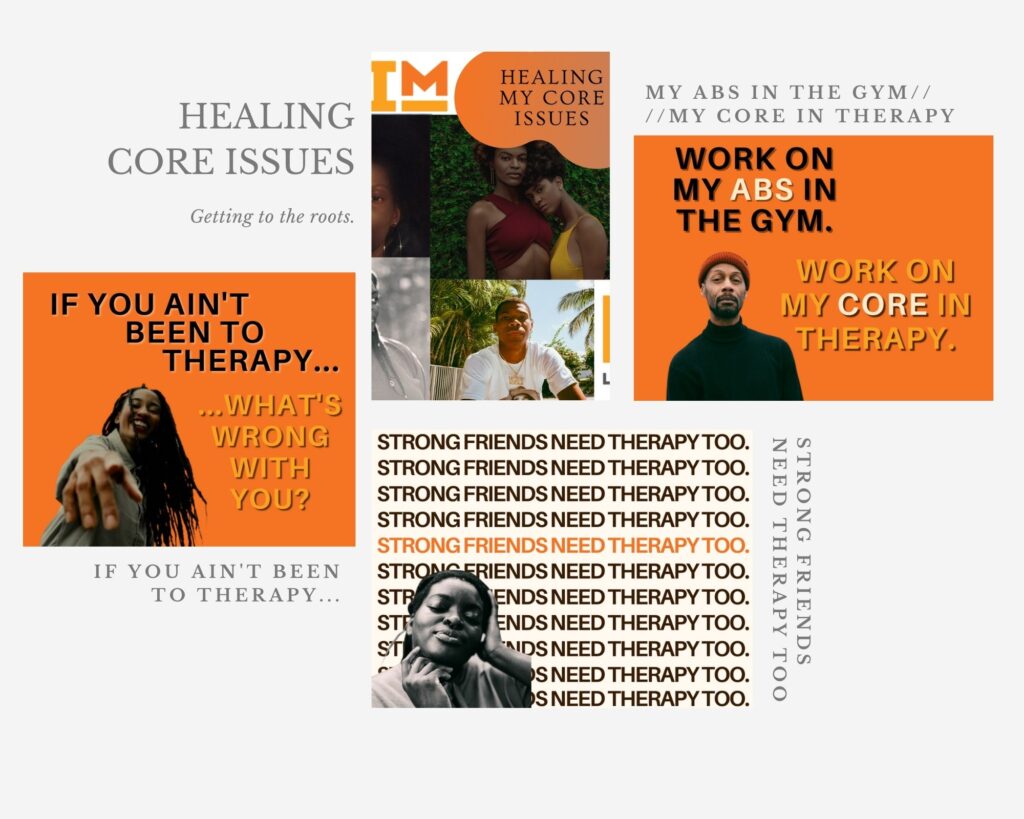
Hey Strong Friend!
Over the past few weeks, I’ve been thinking a lot about what to write in the April blog.
Since April is Stress Awareness Month and Sexual Assault Awareness Month—both topics that can have a strong impact on one’s mental health—I grappled between writing a piece on sexual assault awareness or financial literacy. I eventually decided against both of these ideas.
I made this decision primarily because these are both topics that can be a bit triggering, and I’m not trying to be the one posting triggering content, nor do I desire to create surface level “one size fits all” blog pieces that don’t speak to the core of the issues addressed.
In the end, all my reflection around addressing the “core” of issues inspired the topic for April.
In this month’s blog, we will go into more depth more about core issues and their various mental health manifestations, and we will also share some exciting community updates with you. And later on, we’ll talk about ego, in layman’s terms.
On Core Issues

On Core Issues
Have you ever found yourself engaging in behavior that you don’t love, while continuously asking yourself, “Why do I keep doing that?” If so, this is a prime example of you attempting to identify the core issues influencing certain behaviors.
Oftentimes, core issues are deeply embedded in your subconscious, operating in the background your mind. These core issues typically develop as a result of challenging early life experiences and become an integrated part of your personality well before you consciously realize you have an issue. Core issues usually unveil themselves during times of stress, often revealing how you view yourself and the world around you.
Some common core issues are feelings of abandonment, guilt, being unloved/unlovable, unprotected, unheard, or feeling responsible for others. These core issues can manifest as anxiety, stress, overthinking, depression, relationship/interpersonal issues, people pleasing behaviors, complicated grief, unhealthy use of power and control, and even some physical health issues.
Many folks seek out therapy in order to identify and work through their core issues, and some choose, instead, to find other ways to cope with these issues. Mining for core issues can be an arduous process, causing some people to avoid it at all costs. Personally, I don’t recommend avoidance because it keeps you in unhealthy and unhappy patterns, but I also understand the fears associated with dredging up old wounds. Many folks feel that if they bring up old wounds related to core issues, they may no longer be stable or emotionally safe in their day to day lives. And while there may be a period of pain and instability, if done safely and gently (preferably with a therapist, elder, and/or trusted spiritual leader), the rewards of newfound zeal, healing, and purpose greatly outweigh the pain.
This process is similar to physical fitness and health; some people love it and some people hate it, but if you are consistent and safe, you will yield positive results.
At Eye In Me, we know that therapy is hard work built for the strong. This is why we cater to you as the strong friend and we work hard to end the stigmas related to seeking mental health support. Help us end the stigma around mental healthcare by joining our campaign to heal our core issues. You can share the graphic below on Twitter and LinkedIn using the hashtag #HealingCoreIssues.

EIM Community Updates
This March, Eye In Me hired a new therapist to be part of our team, so please join us in welcoming our newest EIM member, Marialuz Castro, LGPC!

And now, some words from Marialuz herself:
Sometimes you want to speak in the language most comfortable for you, that is why I’m happy to speak English, Spanish, or Spanglish during our sessions. I am here to support you through stress, overthinking, and sadness. My specialty areas include prenatal/postpartum mood changes, couples and individuals facing parenting or intimate relationship challenges, those navigating separation or divorce, and immigrants or first-generation folks from immigrant families who are navigating two cultures.
I welcome all parts of you into our sessions. This may look like saying a quick hello to your children who may have popped in, welcoming your pets to accompany you, or checking out your latest creation. In this come-as-you-are setting, I will guide our dialogue in a way that accesses your inner wisdom and helps you come through tough challenges safer, stronger and more self-aware.
Y ahora, unas palabras de la propia Marialuz:
A veces quieres expresarte en el idioma que te resulte más natural, por eso me alegra ofrecer conversar en inglés, español o spanglish durante nuestras sesiones. Soy una consejera profesional y estoy aquí para ayudarl@ a través del estrés, el pensamiento excesivo y la tristeza.
Mis áreas de especialidad incluyen cambios de humor prenatales / posparto, parejas e individuos que enfrentan desafíos de crianza o relaciones íntimas, aquellos que navegan por la separación o el divorcio e inmigrantes o personas de primera generación navegando dos culturas.
Doy la bienvenida a todos los aspectos de su vida en nuestras sesiones. Esto puede lucir como un saludo rápido a sus hij@s que pueden haber aparecido, dar la bienvenida a sus mascotas para que l@ acompañen o ver su última creación. Ven como eres, así guiaré nuestro diálogo de una manera que llegue a su yo interior y l@ ayude a superar desafíos difíciles de la manera más segura, más fuerte y más consciente de sí mismo.
EGO…..In Layman’s Terms

The word ‘ego’ means something different to psychotherapists than it does to most other people.
While most people define the ego as the root of one’s self-esteem or self-importance, psychotherapists understand the ego as the part of the mind that constantly seeks safety and stability in the real world. A person’s ego serves as the mediator between their socially unacceptable impulsive behaviors and their extremely moralistic, judgmental behaviors.
The ego also has defenses. In our earlier example of avoiding core issues, therapists would refer to this avoidance as a suppression or repression of one’s ego defense. This means that a person unconsciously (or even purposely) avoids thinking about painful things due to a fear of instability, despite the fact that their lives are still impacted by this pain.
If you or someone you love may need to work through some core issues or ego defesnses, then book a free consultation with EIM here.
(image from Verywell Mind)
As I’m sure most of you have heard, this past week, we lost one of the world’s most beloved, charismatic, and influential artists: DMX.

DMX was a rapper, songwriter, and actor who embodied the soul of rap during the turn of the century. DMX was not only a musician though, he was also a man who spent his life spreading joy to others, near and far. Black people both young and old from all across the country have beautiful stories of meeting DMX and getting a chance to speak with him. Of how he extended love to even the people he didn’t know, all while battling his own issues.
During his life, DMX was quite vocal about his decades-long struggle with substance abuse, even writing about it in his autobiography, E.A.R.L.: The Autobiography of DMX. On Friday, he tragically passed away at the age of 50 in White Plains Hospital, NY. DMX’s music and his legacy will live on forever.
Rest in power, DMX.
(December 18, 1970 – April 9, 2021)
We have launched a new social media campain about healing core issues, so be sure to connect with us on LinkedIn and Twitter to be involved and to share your experiences with healing your core issues. Happy Spring, and let’s start this new season off right.
Be Well,
Shatiea Blount, LCSW-C, LICSW, CPC



Comment
Thanks for ones marvelous posting! I definitely enjoyed reading it,
you can be a great author. I will be sure to bookmark your
blog and definitely will come back someday. I want to encourage you to definitely continue your
great work, have a nice morning!